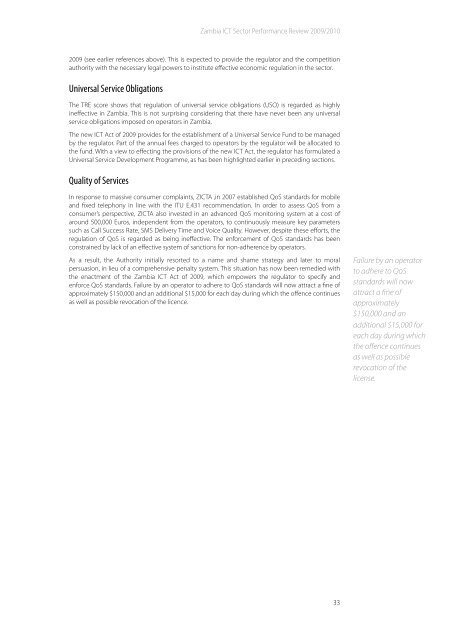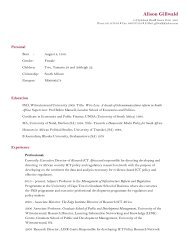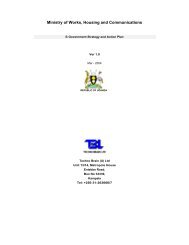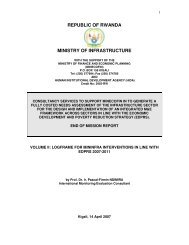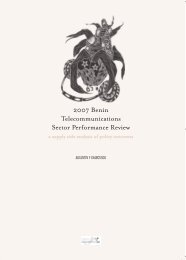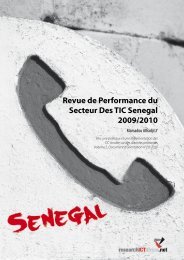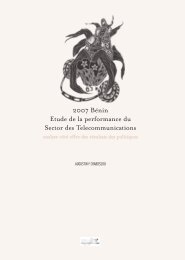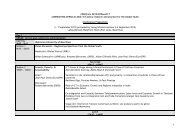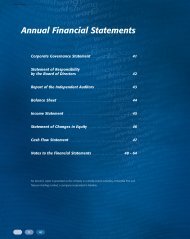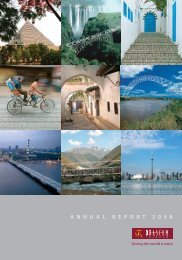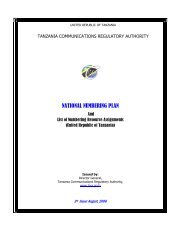Zambia ICT Sector Performance Review 2010 - Research ICT Africa
Zambia ICT Sector Performance Review 2010 - Research ICT Africa
Zambia ICT Sector Performance Review 2010 - Research ICT Africa
You also want an ePaper? Increase the reach of your titles
YUMPU automatically turns print PDFs into web optimized ePapers that Google loves.
<strong>Zambia</strong> <strong>ICT</strong> <strong>Sector</strong> <strong>Performance</strong> <strong>Review</strong> 2009/<strong>2010</strong><br />
2009 (see earlier references above). This is expected to provide the regulator and the competition<br />
authority with the necessary legal powers to institute effective economic regulation in the sector.<br />
Universal Service Obligations<br />
The TRE score shows that regulation of universal service obligations (USO) is regarded as highly<br />
ineffective in <strong>Zambia</strong>. This is not surprising considering that there have never been any universal<br />
service obligations imposed on operators in <strong>Zambia</strong>.<br />
The new <strong>ICT</strong> Act of 2009 provides for the establishment of a Universal Service Fund to be managed<br />
by the regulator. Part of the annual fees charged to operators by the regulator will be allocated to<br />
the fund. With a view to effecting the provisions of the new <strong>ICT</strong> Act, the regulator has formulated a<br />
Universal Service Development Programme, as has been highlighted earlier in preceding sections.<br />
Quality of Services<br />
In response to massive consumer complaints, Z<strong>ICT</strong>A ,in 2007 established QoS standards for mobile<br />
and fixed telephony in line with the ITU E.431 recommendation. In order to assess QoS from a<br />
consumer’s perspective, Z<strong>ICT</strong>A also invested in an advanced QoS monitoring system at a cost of<br />
around 500,000 Euros, independent from the operators, to continuously measure key parameters<br />
such as Call Success Rate, SMS Delivery Time and Voice Quality. However, despite these efforts, the<br />
regulation of QoS is regarded as being ineffective. The enforcement of QoS standards has been<br />
constrained by lack of an effective system of sanctions for non-adherence by operators.<br />
As a result, the Authority initially resorted to a name and shame strategy and later to moral<br />
persuasion, in lieu of a comprehensive penalty system. This situation has now been remedied with<br />
the enactment of the <strong>Zambia</strong> <strong>ICT</strong> Act of 2009, which empowers the regulator to specify and<br />
enforce QoS standards. Failure by an operator to adhere to QoS standards will now attract a fine of<br />
approximately $150,000 and an additional $15,000 for each day during which the offence continues<br />
as well as possible revocation of the licence.<br />
Failure by an operator<br />
to adhere to QoS<br />
standards will now<br />
attract a fine of<br />
approximately<br />
$150,000 and an<br />
additional $15,000 for<br />
each day during which<br />
the offence continues<br />
as well as possible<br />
revocation of the<br />
license.<br />
33


